Discover Blockchain Won't Save the World
Blockchain Won't Save the World

Blockchain Won't Save the World
Author: Anthony Day
Subscribed: 71Played: 1,503Subscribe
Share
© Anthony Day
Description
Cutting through the hype, telling inspiring stories from people and organisations who are creating real change in the world with Blockchain and Exponential technologies.
Listened to in 150+ countries worldwide.
Hosted by: Anthony Day, Blockchain Leader at Midnight
Listened to in 150+ countries worldwide.
Hosted by: Anthony Day, Blockchain Leader at Midnight
107 Episodes
Reverse
You can't deny the influence and appeal of AI right now. What the Action Model team have built is something remarkable. And you'll want to learn more if you're into crypto, build blockchain apps, or are a traditional business...AI is transforming the way we automate and conduct our daily (and business) activities. But we're still sharing our personal data or opinions in exchange for chatbot responses most of the time..The Action Model has combined a way for users to earn rewards from training AI models based on their ACTIONS (how they use apps and websites), build workflows for their most-used activities (a la ClaudeBot) and can drive Bottom of the Funnel impact for businesses or apps looking for usersIn this show we talk about:- The difference between LLMs and Large Action Models- How democratising AI works in practice- Common use cases for the Action Model- ActionFi: a better replacement for InfoFi- How to get early access to the Action Model
What are the 'professionals' investing in this year, and how do you drive success from investments in Blockchain and Crypto startups?These are important questions for VCs, for individuals, and for Web3 as an industry as we move deeper into the 'era of institutions'Mitch brings significant experience investing in innovative technology companies and Blockchain ecosystems. On this show, we discuss:1. Mitch's Background & Web3 Journey 2. An Intro to Fifth Era & Blockchain Coinvestors 3. His Current Investment Thesis for 2026 4. What Makes a Successful Investment 5. What More is Needed For Wider Web3 Adoption
Wallets are where the value is, where users transact, and where we can link intent and action. So why is everyone sleeping on Web3 wallets?Following a 'charmed' panel performance at Zebu Live, Mo and I reconnect to take you through the opportunities and challenges of engaging customers through Web3 wallets, and what's possible for brand and chains todayIn this show we cover:- Mo's diverse history in Web2 and what brought him to Web3- The current state of Web3 wallets and wallet UX- How 'easy' it is to track and target Web3 wallet users- Opportunities and implications for brands and marketeers- Privacy considerations for on-chain data trails
Many complain about the state of usability and user experience (UX) in Web3, and how it's hindering widespread adoption. But Michael argues, we've already solved these issues TODAY...Sequence has a fascinating history, from early days of Web3 Gaming to a modern, EVM-compatible, multi-chain dApp toolkit which is making life easier for builders and users alike. This is a story you need to hear.In this show we cover:- The fascinating Sequence origin story - Current state of the Ethereum and EVM ecosystem- What people mean by 'improving Web3 UX' (and how Sequence solves this)- Interoperability (making cross ETH, L2 and non-ETH chain transactions easy and secure)- What more is required for wider adoption of Web3 and decentralised apps
The institutions are coming! And they're currently driving the next wave of investment and growth in Web3. But what are they looking for in 2025, and how has the go-to-market offering changed for VCs as the industry matures? Mathias and CV VC have been one of the leading institutions driving forward Web3 adoption, first in Crypto Valley and today across the globe. From partnerships in the UAE, reach into LatAm and AsPac. The model today, as with Web3, is truly global.But it's not just capital that the CV team bring to the table. The business model has evolved a LOT since 2018, as has the competition, as TradFi, Exchanges and even wealthy OGs look to muscle in on traditional VC turf.On this show, Mathias will take us through: - The origins of CV VC and CV Labs - What's changed over the years in terms of thesis and offerings - What has the 2025 'Institutional Wave' brought from his viewpoint - What more is needed from VCs to support wider Web3 growth - A look forward to CV Summit in Zurich, Sept 23-24th
People with crypto are ready to pay. This is a call to action for businesses from the travel industry to real estate, from Forex to iGaming. There are 600 Million+ people holding cryptocurrency of some kind, and with EU crypto regulation MiCA comes fully into force, the Genius Bill and stable coin sentiment escalating in the USA; it’s only a matter of time before crypto payments become mainstream.And the good news is, there’s already a solution for businesses: a ‘one button click’ style crypto payments feature today.I’m joined by Max Krupyshev, leader of CryptoProcessing by CoinsPaid - crypto payment gateway, which helps businesses plug into the global crypto economy: fast, secure, and friction-free. He believes that if you think crypto payments are still a thing of the future, you’re already behind, crypto users are no longer so niche.In this show we cover:- How many people with crypto are ready to pay and for what- What paying with crypto looks like for merchants- How IRL businesses really accept crypto - and why they do it- Merchant use cases: what they ask, what they fear, what makes them stay- How to address security, fraud, and fiat conversion- Any question you may have about payments, crypto or CryptoProcessing by CoinsPaid
Cosmos has contributed a LOT to the Web3 space, and is going through a significant revival. It's time to dig deeper into this OG Blockchain ecosystem that has contributed so much to interoperability and cross-chain apps.If you're in Web3, you've probably heard of Cosmos. You've probably heard of Osmosis, and if you're vaguely technical you've probably heard of IBC (Inter-Blockchain Communication protocol). But that's not where the story ends.The Cosmos ecosystem is smart, vibrant and determined. However, for many reasons (which we'll cover on this show) Cosmos hasn't received the recognition or escape velocity it perhaps deserves.On this LinkedIn Live, we meet Crypto Cito, one of the strongest and longest-serving advocates for the Cosmos ecosystem, so who better to give us the story of what was and what will be...In this show we cover:- Cosmos 101 (The tech and why it matters)- Cosmos 201 (The ecosystem and evolution of the community)- Use cases, builders and apps you should know- The roadmap - where next for Cosmos
Animoca Brands are one of the few groups in Web3 that have successfully moved and pivoted with the evolution of Web3. And we're going to learn what it takes to read and succeed in such a tumultuous industry...Yat Siu is one of the busiest, most travelled leaders in Web3. Through deep engagement with founders, investors and innovators all around the world, Yat can filter out what will succeed vs. what is just Crypto Fluff...On this podcast we cover:- The current Animoca Brands investment thesis- Why certain portfolio companies have succeeded of failed- The rise, fall and renovation of Web3 gaming- How to think about Digital Assets, and their many sub-categories- What more is needed to see wider adoption of Web3 technology
Looking for the 'killer app' for Blockchain? Payments much just be it! And Concordium have a master plan for mass adoption...Bitcoin was the first mass-adopted cryptocurrency, but as 'digital gold', it may not be practical for everyday payments. After all, you don't pay for groceries with your pension, right?...Stablecoins have shown that digital assets anchored to FIAT currencies have strong potential, and map well to the traditional financial world. So what is holding back more widespread usage.With Boris, we'll cover the potential of 'PayFi' and give you all a basic understanding of the tech, the vision, and the challenges ahead, including:- An introduction to Concordium- The importance of Stablecoins for Web3 adoption- The importance of privacy, compliance and the role of ZK technology- Important use cases or projects in the Concordium ecosystem- What more is needed for wider adoption of 'PayFi'
Dr. Weijia Zhang is a renowned expert on interoperability, bridges, and is the Regional Head of China for the Enterprise Ethereum Alliance. So he knows a thing or two about what it takes to bring Web3 into production.Interoperability was supposed to be the great accelerator (ahead of privacy tech) for Web3 to really scale and connect apps and ecosystems for the greater good. But have we achieved this yet? Are bridges the answer, or can we do better?In this show, we discuss:- The ideal conditions for use of Blockchain technology- The current technologies and maturity of 'interoperability'- Enterprise use cases Dr. Zhang is most excited about- The role and importance of organisations like EEA and Linux Foundation in driving adoption- What more is needed to see widespread usage of Blockchain technology
Time to pay attention when one of the world's largest Investment Managers leans into Crypto ETFs, Digital Assets and creates its own VC arm: VanEck Ventures. But what's their current outlook on the market and the technology?Juan Lopez, an experienced Web3 investor, is General Partner at VanEck Ventures (and formerly of Circle Ventures) and is looking to make 25-35 investments of tickets between $500k to $1M. As such, he has to understand the current industry requirements, investment narratives, and be able to sort the quality projects from the hype... He's also looking at the intersection between Fintech and AI to better observe how Blockchain and Digital Assets can offer transformation in TradFi and 'traditional' industries.On this show we cover:- Juan’s background and experience in Blockchain and Digital Assets- The VanEck story, and their involvement in Web3- VanEck Ventures - the investment thesis, where they have invested to-date, and what else they are looking to invest in- How traditional financial institutions are looking at Digital Assets today (e.g. Bitcoin, Blockchains, Stablecoins)- What more is needed to see widespread adoption of Digital Assets and Web3 technology
Why aren't a billion people using Blockchains and Crypto everyday? We explore use cases, particularly payments, with Isha from Celo - an Ethereum L2 focused on 'real world adoption'...You wouldn't pay for coffee with your pension... So assuming that Bitcoin (cited by many as a 'digital gold') doesn't fit for everyday usage, what else can we use to get the benefits of Blockchain technology?Celo has been focusing on this particular problem since inception, and in this episode we're going to zoom in specifically on:- Why Ethereum needs L2s- The mission and vision of Celo to drive 'real world' adoption- Use cases that are gaining traction today: In Africa and beyond- Whether Blockchain is a good 'fit' for everyday payments- And what more is needed to see wider adoption
Why does the world need another Blockchain when we have Ethereum? This is the exact question Beniamin and the Elrond (now MultiversX) team pondered in 2017. And have been comprehensively answering ever since.'First Generation' Blockchains like Bitcoin have managed to pass the test of time due to their simplicity. However smart contract chains have evolved, and different protocols have started offering improvements on early-stage designs,In this episode, we cover:- An objective view on the current state of Layer 1 (and Layer 2) Blockchains- What it takes to drive REAL adoption of decentralised technology- An unscripted deep dive into the world of AI for Blockchains- What MultiversX does differently in terms of developer experience, user experience and performance- Learnings from Beniamin's own content creation journey with the Full Shard Podcast- The road ahead - what's next for the MultiversX roadmap
Is this (finally) 'Mass Adoption'? TON may have finally cracked how to put Blockchain and Crypto into the hands of Billions, but how did they get there? And how do you build a blossoming community in the process?Jack Booth, Co-founder of TON Society, a grassroots movement supporting the TON Blockchain community, will share his insight and experience on how we grow vibrant and meaningful communities with Web3 technology. As well as sharing an insider's view into the rapid rise of the TON network.On this show we'll cover:- Introduction to TON and TON Society- The importance of communities for Blockchains projects- What TON Society is doing differently to attract developers and drive engagement- What more is needed to see wider use of Blockchain and DApps
We may be entering the 'end game' for Blockchain and Web3, with different chains being connected seamlessly. But what happens next in this interoperable, connected world?
Supra have been working to provide Web3 with trusted data for 4-years, and now are moving to the next stage of their evolution: 'MultiVM'.
On this podcast, Josh takes us through:
- The history of Supra
- The importance of Oracles
- Why we have failed to deliver meaningful interoperability so far - What is a 'MultiVM'?
- If we've solved for connectivity between chains, what more is required to see widespread adoption of Web3
Note: Sorry for the poor audio quality on Anthony's mic. Still some teething issues with the new recording setup!
Don't we have enough Blockchains already? Short answer: No... And Azeem from Morph is going to explain why, in full HD!...Blockchains keep evolving, and Layer 2s present an opportunity to provide unique functionality, integrations and experiences for dApp builders. And Morph is a really interesting example of an L2 that is innovating beyond just the chain code.This is an in-depth discussion around why the world still needs more L2s, and what are the key tactics for launching and growing 'yet another' Blockchain in 2024. We cover:- Morph 101- Why Ethereum, and Web3 in general, need another L2- What's required to build a blockchain ecosystem- What Morph are doing to differentiate from other L1s and L2s- How to grow Web3 adoption without fragmenting ecosystems, developers and funding- What’s next for Morph, and the roadmap ahead
Decentraland pioneered the crossover of Blockchain and the Metaverse, and now they're back with version 2.0. And they've been working on some important things along the way...
I'm joined by Yemel Jardi, a Web3 veteran, developer, Executive Director of Decentraland, and occasional virtual 'celebrity'.
We take a look back over the launch and growth of Decentraland, the challenge of competing with established gaming and VR categories, and what it took to develop Decentraland 2.0, including:
- Decentraland 101
- The state of the Metaverse in 2024
- Decentraland vs. Fortnite vs. Minecraft
- Parties, Hide & Seek, and What Decentraland User Get Up To
- The Challenge of Building Governance for a Virtual World
- What More is Needed to See More People Use Virtual Worlds
Without Blockchain nodes, there would be no Blockchain. But not all nodes are created equal. And many chains are falsely claiming 'decentralisation'. Chris from BlockJoy is on a mission to enable better Blockchain infrastructure...
The reality is that Web3 is still heavily dependent on the Cloud. But should users, developers and communities care: 'Yes' according to Chris.
In this episode, we'll give everyone an introduction to Blockchain nodes, and cover a range of other important topics, including:
- Nodes 101
- Mapping Web3's Cloud Dependency
- Why Bare Metal Servers are 'So Back'
- What It Takes to Build Validator Infrastructure
- How We Deliver 'Better' Decentralisation
- The Future of Blockchain Infrastructure
The ZK series continues with Hubert and vlayer: an exciting team looking to give back control and equitability of data using Blockchain technology...
If you're not paying attention to zero-knowledge technology at this point in the evolution of the internet and decentralised applications, you should be. And it's refreshing to see that not all teams are correlating the 'data opportunity' with just AI - but the wider petabytes of data that humans and businesses create every day.
On this show, Hubert and I will delve deeper into the applications for ZK in building a more equitable internet for all of us, including:
- WTF are Web Proofs
- Why the world needs another data infrastructure company (and where others have failed to-date)
- Learnings from Hubert's experience with data fraud, and what needs to change to protect sensitive data in future
- The vlayer origin story, and major use cases
- Why people should care about data protection
- Alternative approaches to data protection and comparisons
Many (including myself) are hailing ZK as the technology that will finally enable mass adoption of Web3. But how? And what's missing today that ZK provides?
Ken Timsit is a Web3 veteran and a strong advocate for ZK tech. He is MD of Cronos Labs and its Particle B ecosystem accelerator, and was previously CRO at Consensys.
On this show, we're going to be covering as much as possible on the proposition and benefits of zero-knowledge, and how it is being applied in Web3 today, including:
- An introduction to Cronos
- An overview of the ZK landscape, and how it’s being used today (Roll-ups, data protection, EVMs, L1s vs. L2s) - Important use cases for ZK
- The opportunity for ZK and DeFi to drive further adoption - Challenges and limitations of ZK today
- What more is required for wider adoption of Web3 in general




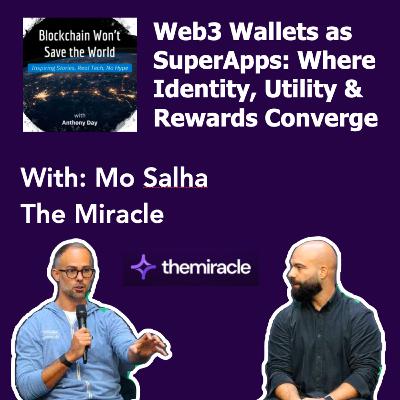

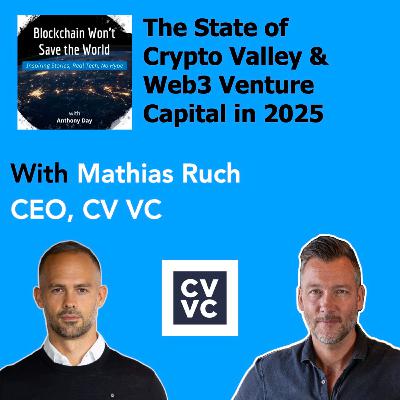
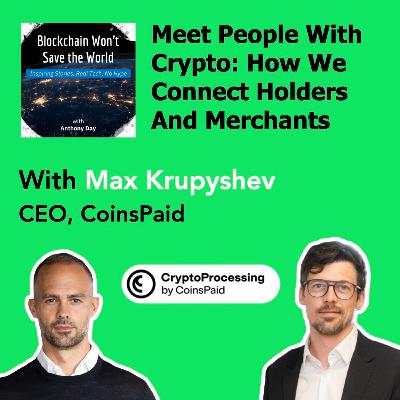
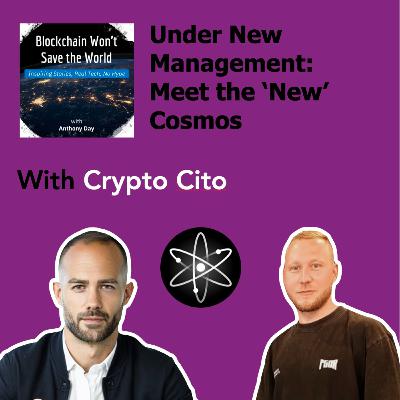
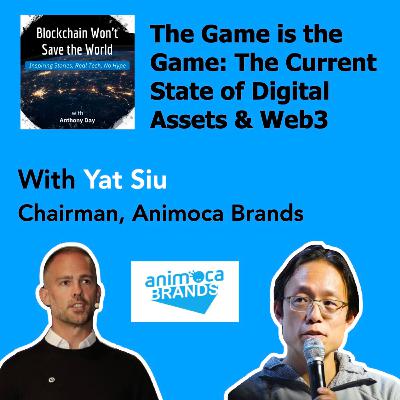

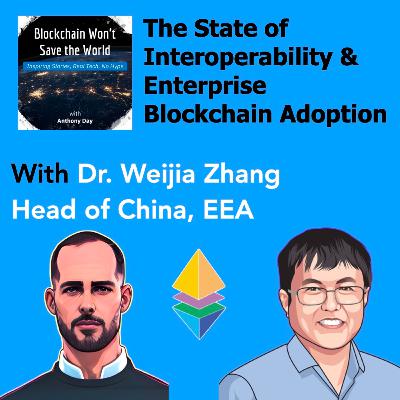


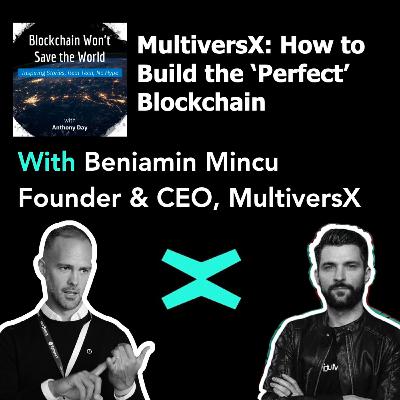
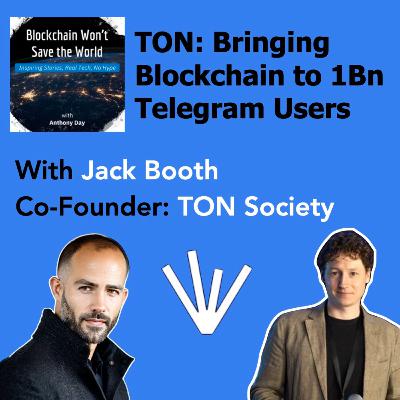









Hi! I really enjoy your podcast. Have you considered publishing it with transcript? It would make it more accessible for everyone. Just a thought! Thanks for considering.